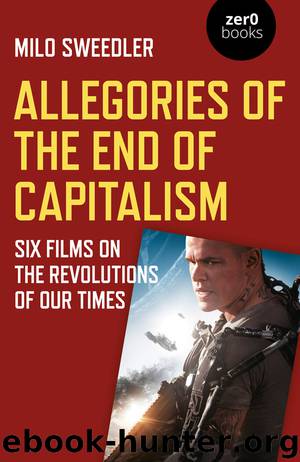Allegories of the End of Capitalism by Milo Sweedler;

Author:Milo Sweedler;
Language: eng
Format: epub
Publisher: John Hunt (NBN)
Published: 2019-11-12T16:00:00+00:00
Chapter 4
The Insurrection to Come: Django Unchained
In a three-part interview with historian and literary critic Henry Louis Gates Jr., filmmaker Quentin Tarantino responds to questions that his interviewer asks him about Django Unchained (2012), Tarantino’s spaghetti Western about an African American slave turned retributive gunslinger in the antebellum US South. At one point, Gates asks his interviewee what motivated him to make a movie representing the suffering of slaves during the pre-Civil War era. Tarantino gives a roundabout answer that begins by explaining that prior to making the picture, he was writing film criticism on Italian filmmaker Sergio Corbucci (1926–90), whose Django (1966) is one of Tarantino’s primary intertexts in Django Unchained. The interviewee says that no filmmaker’s vision of the Wild West is as brutal and merciless as Corbucci’s, and then proceeds to offer a three-step response to Gates’ question, moving from an allegorical interpretation of Corbucci’s ultraviolent cowboy movies to his decision to rework the Corbucci Western in a feature film of his own and finally to the choice to set his version of Django in the Deep South during the antebellum period. “I was working on a piece on Sergio Corbucci,” Tarantino explains.
And it really did seem like in his cowboy pictures what he truly was dealing with was fascism—which makes sense, as Italy was getting out from under Mussolini’s boot heel not so long ago—just gussied up with cowboy-Mexican iconography. Even when his outlaws would take over a town or something, it had the feeling of a Nazi occupation, and with Holocaust-like suffering to the victims.
So I’m writing all this, and part of the thing that’s fun about subjective criticism is it doesn’t really matter what the director was thinking. It’s about you making your point. So at some point I was like, I don’t really know what Sergio Corbucci was thinking at the time, but I know I’m thinking it now, and I can do it.
And with that in mind, this violent, pitiless Corbucci West: What would be the American equivalent of that—that really would be real—that would be an American story? It was being a slave in the antebellum South.1
Download
This site does not store any files on its server. We only index and link to content provided by other sites. Please contact the content providers to delete copyright contents if any and email us, we'll remove relevant links or contents immediately.
| Anarchism | Communism & Socialism |
| Conservatism & Liberalism | Democracy |
| Fascism | Libertarianism |
| Nationalism | Radicalism |
| Utopian |
The Secret History by Donna Tartt(18145)
The Social Justice Warrior Handbook by Lisa De Pasquale(11950)
Thirteen Reasons Why by Jay Asher(8441)
This Is How You Lose Her by Junot Diaz(6430)
Weapons of Math Destruction by Cathy O'Neil(5822)
Zero to One by Peter Thiel(5484)
Beartown by Fredrik Backman(5347)
The Myth of the Strong Leader by Archie Brown(5235)
The Fire Next Time by James Baldwin(5014)
How Democracies Die by Steven Levitsky & Daniel Ziblatt(4950)
Promise Me, Dad by Joe Biden(4907)
Stone's Rules by Roger Stone(4852)
100 Deadly Skills by Clint Emerson(4683)
A Higher Loyalty: Truth, Lies, and Leadership by James Comey(4546)
Rise and Kill First by Ronen Bergman(4542)
Secrecy World by Jake Bernstein(4385)
The David Icke Guide to the Global Conspiracy (and how to end it) by David Icke(4376)
The Farm by Tom Rob Smith(4320)
The Doomsday Machine by Daniel Ellsberg(4240)
